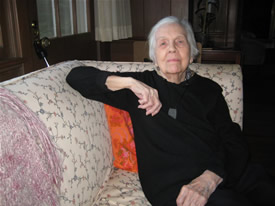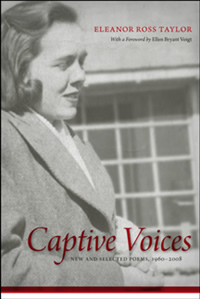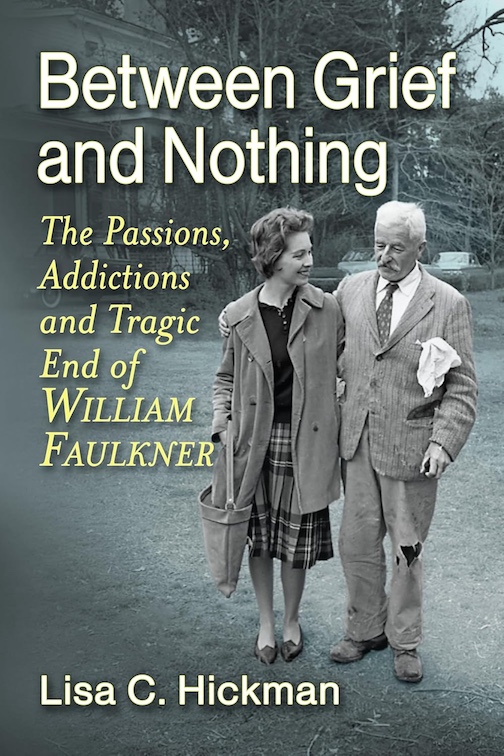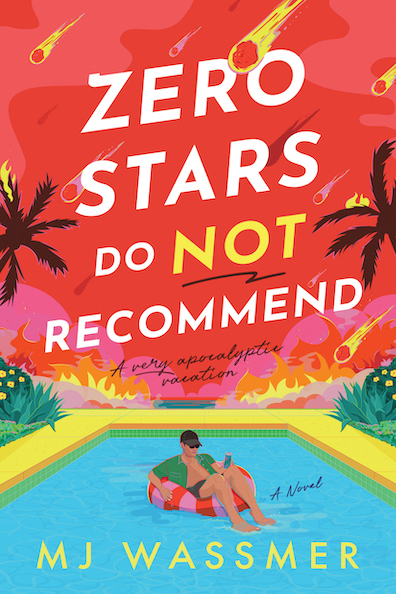In Her Own Right
A poet considers the lasting influence of Eleanor Ross Taylor
My admiration of the life and work of Eleanor Ross Taylor—poet and widow of Peter Taylor—is longstanding and ungoverned by any boundaries that occur to me offhand.
I should note that I don’t consider myself a literary critic. Rather, I am a passionate, studious, unfashionably earnest reader and an advocate for the books—especially books of poetry—I care deeply about. But even in the back-scratching world of contemporary poetry, I am no more afraid of candor than Mrs. Taylor herself. Shortly after we first met, she demanded that the University of Utah Press immediately cease distribution of Days Going/Days Coming Back and produce a new edition because the original cover featured a group of tombstones: “I can’t send this to my friends, so many of them widowed,” she said. (A signed copy of the book remains one of my most prized possessions, though Mrs. Taylor—I can’t help it; that’s the way she was introduced to me at the Sewanee Writers’ Conference, and what I always called her—scowled as she took out her pen.)
This story illustrates not only Mrs. Taylor’s verbal fearlessness, on the page and in person, but also the loyalty and admiration she inspired in other poets. Dave Smith was then the editor of Utah’s poetry series, and though he played no part in choosing the tactless cover art of Days Going / Days Coming Back, it says a great deal about the mutual respect Smith and Mrs. Taylor have always retained for each other that he went on to print both of her next collections—Late Leisure (1999) and now Captive Voices, introduced superbly and with what can only be described as an ominous clarity by Ellen Bryant Voigt—as part of his Southern Messenger Series at LSU Press.
 “Welcome, Eumenides”—has there ever been a less timorous invitation, issued by the title poem, of Mrs. Taylor’s second book? The Eumenides are the Furies of Greek myth, presumably tamed by the forces of Athena and Law. Mrs. Taylor welcomed Furies, tamed and untamed, into her life in the same way she welcomed the visitors, invited and not, who swelled her yearly gatherings in the early years of the Sewanee Writers’ Conference. She was no more cowed by Furies than by the men who gobbled her pigs-in-blankets in the house where she and Peter kept the summer thermostat above eighty degrees, perhaps because they felt most at home in the heat to which they had become accustomed in their youths. She generally wore freshly-pressed, short-sleeved shirtdresses, and I never noticed a single drop of perspiration on her brow—unlike my own, being of that later generation acclimated to air-conditioning—as she graciously made her way through sweaty and largely ignorant crowds, people who knew nothing of her own poetic accomplishments and were thrilled only at being in the home of Peter Taylor.
“Welcome, Eumenides”—has there ever been a less timorous invitation, issued by the title poem, of Mrs. Taylor’s second book? The Eumenides are the Furies of Greek myth, presumably tamed by the forces of Athena and Law. Mrs. Taylor welcomed Furies, tamed and untamed, into her life in the same way she welcomed the visitors, invited and not, who swelled her yearly gatherings in the early years of the Sewanee Writers’ Conference. She was no more cowed by Furies than by the men who gobbled her pigs-in-blankets in the house where she and Peter kept the summer thermostat above eighty degrees, perhaps because they felt most at home in the heat to which they had become accustomed in their youths. She generally wore freshly-pressed, short-sleeved shirtdresses, and I never noticed a single drop of perspiration on her brow—unlike my own, being of that later generation acclimated to air-conditioning—as she graciously made her way through sweaty and largely ignorant crowds, people who knew nothing of her own poetic accomplishments and were thrilled only at being in the home of Peter Taylor.
This is not to say that in those years Mrs. Taylor’s activities were confined to hosting aspiring writers with large appetites. In quieter hours, she and Peter (he insisted on being called by his first name, and I somehow managed to comply) were reading aloud to one another the collected letters of Elizabeth Bishop, and Mrs. Taylor was beginning to write the poems that eventually appeared in Late Leisure. She had also been reading, she told me, a great deal of “subliterary material”—Southern history, letters, and biography, especially as these pertained to women. (“Read at whim! Read at whim!” I can hear Randall Jarrell’s command to aspiring poets, one which Mrs. Taylor doubtless heard over and over when she was his student.) Her remark planted a seed in me that strives to blossom almost twenty years later as I continue work on a manuscript that contains much of my own family history, and also that of the Mississippi bluesman Robert Johnson.
Mrs. Taylor’s immediate family, which was composed of four writers, deserves a history of its own. Her sister Jean (Donald Justice’s widow) continues to publish short stories, and her niece, Heather Ross Miller, is a distinguished poet who has written an essay on her aunt that appears in The Lighthouse Keeper: Essays on the Poetry of Eleanor Ross Taylor (Hobart and William Smith Colleges, 2001). Also contained in the collection, edited by the inimitable Jean Valentine, for whom this was surely a labor of love of the most demanding sort, are superb pieces by Betty Adcock (another excellent Southern female poet who has never gotten her due), Randall Jarrell, Richard Howard, Adrienne Rich, the increasingly indispensable James Longenbach, and Ellen Bryant Voigt, who is Mrs. Taylor’s own natural literary heir in many ways.
Mrs. Taylor could be scathing in conversation and correspondence during the years we saw and wrote each other regularly. She described one prominent editor as a downright “sadist,” especially with young writers. Indeed, she said she suspected him of requesting work from promising younger writers merely for the pleasure of composing what he imagined were especially witty rejection notes. She saw even people she obviously loved with the same clear-eyed vision. There are several lovely, poignant poems about Jarrell in her canon, but she wrote me a letter once, after I had sent her an audiotape of Jarrell reading aloud, which characterized his reading style as “coy, half-condescending, over-emotional.” She feared, on this occasion at least, that “he found his own wit irresistible.”
 The phrase that sticks with me the most strongly from Mrs. Taylor’s work is “my set,” which comes from an earlier—and, yes, scathing—poem, “The Painted Bridge.” Our letters contain a hilarious—to me, at least, with my ungovernable hair—anecdote about her attempt to cancel a lunch date with the novelist John Casey because of an abortive visit to “the beauty shop” earlier in the week. Its hot water supply had been cut off, so she went home and attempted to set her hair herself. She looked, she said, so frightful that she didn’t think she should appear in public. “That’s the flimsiest excuse I ever heard,” Casey replied.
The phrase that sticks with me the most strongly from Mrs. Taylor’s work is “my set,” which comes from an earlier—and, yes, scathing—poem, “The Painted Bridge.” Our letters contain a hilarious—to me, at least, with my ungovernable hair—anecdote about her attempt to cancel a lunch date with the novelist John Casey because of an abortive visit to “the beauty shop” earlier in the week. Its hot water supply had been cut off, so she went home and attempted to set her hair herself. She looked, she said, so frightful that she didn’t think she should appear in public. “That’s the flimsiest excuse I ever heard,” Casey replied.
In its poetic context, however, “my set” is obviously a reference to more than her coiffeur. She’s speaking of her set station in life as the lifelong partner of her far-better-known husband, and the station in life imposed by Southern womanhood—the set to which she belongs, not necessarily by choice. And, perhaps most important of all, she’s referring to the set to which she has confined herself. I’ll let a statement from Jarrell’s introduction to Wilderness of Ladies explain this one: “The world is a cage for women, and inside it the woman is her own cage.”
In some ways, Mrs. Taylor’s entire canon can be summed up by the vivid, singular, and, yes, sometimes furious titles she chose for her work. But like Emily Dickinson, whom Rich notably called “Vesuvius at Home,” Mrs. Taylor’s anger is surpassed by her lyric gifts. Anyone can be angry at the limitations imposed by—oh, dear God, let us outgrow those terms of “race, class, and gender,” but for now, they’re what we’ve got—the hand that life deals us, but Mrs. Taylor has never had any use for whining for a better hand or for looking back at the cards she might have been dealt. In the last letter I received from her, she gave me, as both a consolation for loss and a warning, the best advice of my life, and perhaps my work as well: “Unhappiness takes so much time.”
I doubt that Eleanor Ross Taylor wasted very many hours on anything, but especially not on self-pity. All poets wish to leave behind first-caliber work that, however absurdly overlooked and under-known in her life, will last. And on this particular score, Mrs. Taylor has no reason for self-pity whatsoever.
[This essay first appeared on December 17, 2009.]


